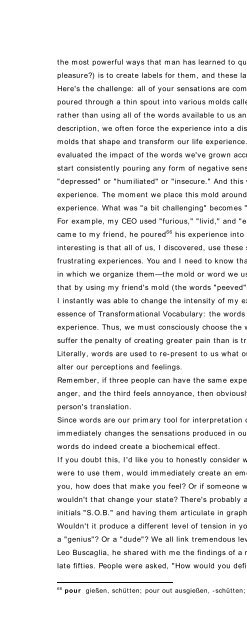Anthony Robbins AWAKEN THE GIANT... - Lemma Coaching
Anthony Robbins AWAKEN THE GIANT... - Lemma Coaching
Anthony Robbins AWAKEN THE GIANT... - Lemma Coaching
Create successful ePaper yourself
Turn your PDF publications into a flip-book with our unique Google optimized e-Paper software.
the most powerful ways that man has learned to quickly decide what sensations mean (is it pain or<br />
pleasure?) is to create labels for them, and these labels are what you and I know as "words."<br />
Here's the challenge: all of your sensations are coming to you through this funnel, like liquid sensation<br />
poured through a thin spout into various molds called words. In our desire to make decisions quickly,<br />
rather than using all of the words available to us and finding the most appropriate and accurate<br />
description, we often force the experience into a disempowering mold. We form habitual favorites:<br />
molds that shape and transform our life experience. Unfortunately, most of us have not consciously<br />
evaluated the impact of the words we've grown accustomed to using. The problem occurs when we<br />
start consistently pouring any form of negative sensation into the word-mold of "furious" or<br />
"depressed" or "humiliated" or "insecure." And this word may not accurately reflect the actual<br />
experience. The moment we place this mold around our experience, the label we put on it becomes our<br />
experience. What was "a bit challenging" becomes "devastating."<br />
For example, my CEO used "furious," "livid," and "enraged"; I called it "angry" or "upset"; and when it<br />
came to my friend, he poured 66 his experience into the mold of "peeved" or "annoyed." What's<br />
interesting is that all of us, I discovered, use these same patterns of words to describe multitudes of<br />
frustrating experiences. You and I need to know that we can all have the same sensations, but the way<br />
in which we organize them—the mold or word we use for them—becomes our experience. I later found<br />
that by using my friend's mold (the words "peeved" or "annoyed")<br />
I instantly was able to change the intensity of my experience. It became something else. This is the<br />
essence of Transformational Vocabulary: the words that we attach to our experience become our<br />
experience. Thus, we must consciously choose the words we use to describe our emotional states, or<br />
suffer the penalty of creating greater pain than is truly warranted or appropriate.<br />
Literally, words are used to re-present to us what our experience of life is. In that representation, they<br />
alter our perceptions and feelings.<br />
Remember, if three people can have the same experience, yet one person feels rage, another feels<br />
anger, and the third feels annoyance, then obviously the sensations are being changed by each<br />
person's translation.<br />
Since words are our primary tool for interpretation or translation, the way we label our experience<br />
immediately changes the sensations produced in our nervous systems. You and I must realize that<br />
words do indeed create a biochemical effect.<br />
If you doubt this, I'd like you to honestly consider whether or not there are words that, if someone<br />
were to use them, would immediately create an emotional reaction. If someone hurls a racial slur at<br />
you, how does that make you feel? Or if someone were to call you a four-letter word, for example,<br />
wouldn't that change your state? There's probably a big difference between someone calling you by the<br />
initials "S.O.B." and having them articulate in graphic detail the phrase these letters stand for.<br />
Wouldn't it produce a different level of tension in your body than if they were to call you an "angel"? Or<br />
a "genius"? Or a "dude"? We all link tremendous levels of pain to certain words. When I interviewed Dr.<br />
Leo Buscaglia, he shared with me the findings of a research study done at an eastern university in the<br />
late fifties. People were asked, "How would you define communism?" An astonishing number of the<br />
66 pour gießen, schütten; pour out ausgießen, -schütten; Getränk eingießen; strömen (auch übertragen)


